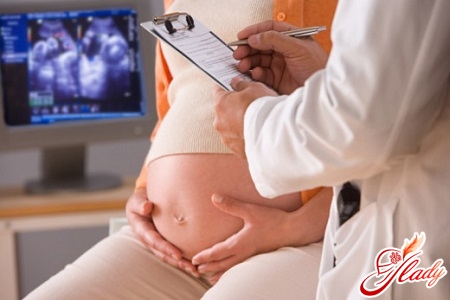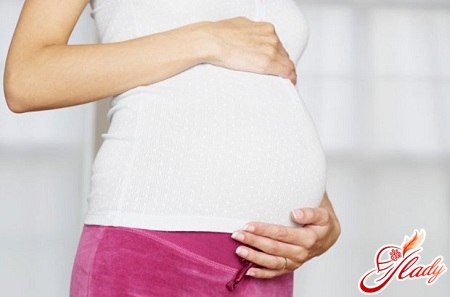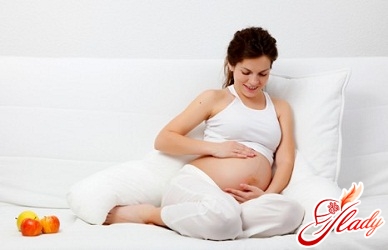 Probably no woman who has become a mothercan boast that she has never experienced abdominal pain in the entire 9 months. Moreover, pain most often occurs in the early stages - in the first trimester. Which, however, is completely natural - pregnancy leads to significant changes in the body of the expectant mother. The pelvic organs shift, muscle fibers and ligaments stretch. And as a result - there is a pulling pain in the lower abdomen. Such pulling pains do not pose any danger and are completely normal. Although, of course, you should not relax either - pulling pains in the lower abdomen are not always harmless. In some cases, it can indicate serious problems, up to the threat of termination of pregnancy. Therefore, the only correct decision in this situation is to seek help from a gynecologist as soon as possible. He will examine you and determine why there is a pulling pain in the lower abdomen. All the information you will find in this article is only an overview and should in no way become the basis for trying to determine what is wrong with you and why you have abdominal pain. And certainly never try to prescribe treatment for yourself - remember that not only your health is at stake, but also the life of your future child. After all, pain in the lower abdomen is not always so innocent.
Probably no woman who has become a mothercan boast that she has never experienced abdominal pain in the entire 9 months. Moreover, pain most often occurs in the early stages - in the first trimester. Which, however, is completely natural - pregnancy leads to significant changes in the body of the expectant mother. The pelvic organs shift, muscle fibers and ligaments stretch. And as a result - there is a pulling pain in the lower abdomen. Such pulling pains do not pose any danger and are completely normal. Although, of course, you should not relax either - pulling pains in the lower abdomen are not always harmless. In some cases, it can indicate serious problems, up to the threat of termination of pregnancy. Therefore, the only correct decision in this situation is to seek help from a gynecologist as soon as possible. He will examine you and determine why there is a pulling pain in the lower abdomen. All the information you will find in this article is only an overview and should in no way become the basis for trying to determine what is wrong with you and why you have abdominal pain. And certainly never try to prescribe treatment for yourself - remember that not only your health is at stake, but also the life of your future child. After all, pain in the lower abdomen is not always so innocent.
Pain as a sign of pregnancy
If you are experiencing a delay in pregnancy,признаки, красноречиво свидетельствующие о том, что вы готовитесь стать мамой, а уж тем более если тест на беременность положителен — сомнений у вас нет. Но очень-очень часто женщины начинают внимательно прислушиваться к своему организму еще даже до задержки менструации. И если вероятность наступления беременности высока, вы можете почувствовать самый первый ее признак — тянущие боли в нижней части живота. Такие болевые ощущения внизу характерны практически для всех женщин — просто у кого-то живот болит сильнее, а у кого-то — едва заметно. А уж в том случае, если для женщины привычны боли внизу живота перед месячными, она этих ощущений, связанных с беременностью, может попросту не заметить. Почему же болит живот, а точнее его низ, в самом начале беременности? Для этого чтобы понять это, необходимо четко понимать, что же представляет из себя сам процесс оплодотворения. Итак, яйцеклетка и сперматозоид соединились, образовалось плодное яйцо. Несколько дней оно движется по фаллопиевым трубам. Когда плодное яйцо достигает своей конечной цели — матки, оно начинает имплантироваться в ее слизистую оболочку. И происходит эта имплантация примерно за несколько дней до даты очередной менструации. Сам процесс внедрения плодного яйца зачастую сопровождается неинтенсивными болевыми ощущениями внизу живота. И именно эти боли зачастую женщины воспринимают за предвестников менструации. А на самом деле вполне может быть, что боль внизу живота говорит о том, что новоселье вашего крохи состоялось. Иногда женщины недоумевают — ну почему совершенно естественный процесс имплантации сопровождается болевыми ощущениями? На самом деле это вполне объяснимо и нормально — прежде чем имплантироваться в слизистую оболочку, яйцеклетка как бы расчищает себе место. Кстати говоря, иногда этот процесс влияет даже на целостность слизистой. Хотя, конечно же, ее повреждения крайне минимальны. Но тем не менее в некоторых случаях имплантация может сопровождаться даже скудными кровянистыми выделениями. И чаще всего такие выделения воспринимаются женщинами как преждевременное начало менструации. Кстати говоря, живот внизу болит не всегда — порой бывают только выделения, без боли. Врачи-гинекологи рассказывают об еще одном очень интересном явлении. Они утверждают, что очень часто женщина теряет беременность, даже не подозревая о ее существовании. Природа очень умна и позаботилась о том, чтобы на свет появлялись только здоровые существа — в том числе и люди. В науке такое явление называется естественным отбором. И если оплодотворенная яйцеклетка окажется с каким-либо генетическим дефектом — а такое происходит очень часто — организм женщины просто отторгнет ее. Причем на самым ранних сроках — в большинстве случаев яйцеклетке не удается даже имплантироваться в стенку матки. Как результат — самопроизвольное прерывание беременности. В том случае, если женщина не подозревает о своем положении, она и не поймет, что случилось — боли очень слабые, выделения необильные и их принимают за менструацию. Конечно же, в некоторых случаях у женщины имеются и прочие признаки беременности — небольшая тошнота, раздражительность, набухшая грудь, потягивает низ живота и поясница. Но все эти симптомы встречаются и во время обычного предменструального синдрома — ну поболит живот и пройдет. Ну а если вы знаете о своей беременности и почувствовали болевые ощущения в нижней части живота или в пояснице, а уж тем более если заметили хотя бы намек на кровянистые выделения, не раздумывайте — сразу же отправляйтесь за помощью к врачу-гинекологу. 
Urgently consult a doctor!
As sad as it is to realize, but approximatelyEvery fortieth pregnancy ends in miscarriage. Moreover, the lion's share of all cases occur in the early stages - in the first trimester. Sometimes the cause of the miscarriage is clear, but more often than not, even doctors cannot name it - some manage to work hard, carry an older child up to the fifth floor in their arms, along with a stroller and bags, and do not experience any discomfort, not to mention the threat of termination of pregnancy or even pain. Other women can lose their baby simply by stumbling or turning sharply. Moreover, you should be sensitive to yourself even if everything that is happening is not new to you and during your first pregnancy you felt great and your stomach never hurt - you can never be sure that everything will go just as smoothly this time. You should call an ambulance immediately if you notice the following symptoms:
- The pain intensifies
If the pain is weak and does not changeintensity, you can easily get to the doctor yourself - most likely, your pain is physiological and does not pose any threat. But if the pain intensifies, the lower part pulls very intensely, you need to act immediately - this may indicate the beginning of a miscarriage. Take a No-shpa tablet, go to bed and wait there for the doctors to arrive. And do not even think about putting anything on your stomach - neither cold nor warm! This will not relieve the pain, but you will most likely develop complications.
- Pain becomes obtrusive
Normally, the pain should not be too severegreatly disturb the expectant mother. But if the pain becomes too annoying and prevents you from concentrating on anything, you should worry. Don't risk it - call a doctor. It's better to let him dispel your fears than to miss the beginning of a serious problem.
- Severe localization of pain
You should also be concerned if the painlocalized somewhere in a certain place - most often on the side. In this case, you need an ultrasound examination, which will help determine whether you have encountered such an unpleasant phenomenon as an ectopic pregnancy.
- Bloody issues
If not only do you have a stomach ache, but you alsonoticed bloody discharge, you need to consult a doctor as soon as possible. And it doesn’t matter at all whether there is a lot of blood or just a few drops, pale pink, brown or scarlet discharge - they all indicate that something went wrong and you and your baby need help. By the way, sometimes there is only blood, without pain - perhaps a slight pulling sensation in the lower abdomen. Most likely, you have begun to detach the ovum - in other words, a miscarriage. But do not panic right away - in most cases, timely treatment allows you to stop and reverse this pathological process and a wonderful healthy baby will be born. But in some cases, alas, bleeding may indicate a frozen pregnancy and the woman will need curettage of the uterine cavity. In addition, if something confuses or scares you - and it is not necessarily your stomach that hurts -, you should consult a doctor in any case. Only a doctor can conduct an examination, assess the situation and dispel your fears. Or, if something is really wrong, prescribe treatment. So close the forum tab for expectant mothers - you definitely won't find any smart advice there - and go to the clinic.
Obstetrical problems
Lower abdominal pain during pregnancyare divided into two types - obstetric and non-obstetric. We have already briefly mentioned them above, but let's look into them in more detail - who knows, maybe this information will be useful for you. So, obstetric problems include:
- Frozen pregnancy
In some cases, under the influence of certainfactors, the development of the fetus simply stops - this phenomenon is called a frozen pregnancy in medicine. For some time, the woman does not even suspect what happened, but sooner or later the body will try to get rid of the dead fertilized egg - the woman begins to feel pain - most often in the lower abdomen. Most often, this is accompanied by bloody discharge.
- Ectopic pregnancy
It is very rare that the fertilized egg does notreaches its destination and attaches not to the uterus, but to the fallopian tubes - an ectopic pregnancy begins to develop. As the fetus grows, the tube begins to stretch and the woman feels pain - most often on one side of the abdomen. Soon after, bloody discharge appears. Unfortunately, it is impossible to save such a pregnancy. However, medical assistance is absolutely necessary - otherwise, the tube will simply burst. By the way, the lower abdomen begins to pull about two weeks before the onset of intense pain.
- Spontaneous miscarriage
It should not be forgotten that in some cases painmay indicate a spontaneous miscarriage. Depending on the stage of the process, doctors distinguish three types. Threatened miscarriage - the process has not yet begun, but there is a high risk. The woman feels heaviness in the lower abdomen, light pulling pain in the lumbar and sacral region. When a miscarriage has begun, the pain intensifies - the stomach hurts unbearably - and bloody discharge joins them. When an abortion is in progress, these symptoms intensify even more. But at these stages, the process is reversible if the woman receives qualified help in a timely manner. But if a complete miscarriage has occurred - doctors are already powerless, since there is a complete or partial expulsion of the fetus from the uterine cavity. The pain in such a situation is very strong, and bleeding may also begin. Then the stomach suddenly stops hurting, but this is not a reason to relax. In most cases, the doctor decides to perform curettage of the uterine cavity to prevent the development of an inflammatory process or infection.
- Inflammatory processes
In some cases, pain may occurarise due to severe inflammatory processes. It is generally accepted that during pregnancy, illnesses bypass a woman. But gynecologists claim the opposite - pregnancy is a catalyst for gynecological diseases. Depending on the inflammatory process, the abdomen may hurt very badly, or it may only slightly pull the bottom. But treatment must be started as quickly as possible in any case.
Other problems
But pain does not always indicategynecological problems. Remember that there may be other reasons, in no way related to pregnancy, that lead to abdominal pain or lower abdominal pain. The most common diseases are:
- Cystitis
The anatomy of a woman is such that the ureteris located very close to the genitals. And it is very difficult to determine where exactly the pain is localized. And the bladder is located in the lower abdomen - it is easy to confuse. And during pregnancy, cystitis occurs extremely often. In this case, pain in the lower abdomen is accompanied by frequent urination, and sometimes a burning sensation. Cystitis should never be ignored - in most cases, it develops due to infections. It is easy to guess that any infection poses a serious threat to the health of your baby. Treatment of cystitis should be carried out under the strict supervision of both a urologist and a gynecologist.
- Problems with the intestines
Nagging pains can also occur in the event thatif a pregnant woman has problems with digestion. Flatulence, constipation, diarrhea - all this is absolutely normal for the first trimester of pregnancy, as serious hormonal changes occur in the body. And all these problems often lead to the occurrence of aching pain. It is worth normalizing digestion and the pain will go away.
- Appendicitis
One must not forget about this possible cause of pain,like appendicitis - of course, only if it has not been removed yet. In this case, nausea, weakness, headache and fever join the pain. In any case, a surgeon's consultation is simply necessary. If the diagnosis is confirmed - do not be upset, the operation does not pose any threat to you and/or the baby. We recommend reading:









